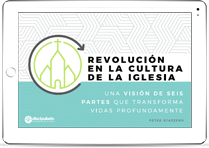UnHealthy Leadership and the 4 Destructive Commandments of Contemporary Church Culture
In this month’s conversation between Rich Villodas and Pete Scazzero they discuss Pete’s upcoming book Emotionally Healthy Leader. Pete shares the 4 Characteristics of Emotionally UnHealthy Leaders and the 4 Destructive Commandments of Contemporary Church Culture. Click play below to watch the video and get ready to take notes as you watch this deeply challenging conversation between Rich and Pete. To download or subscribe to the podcast go iTunes.






